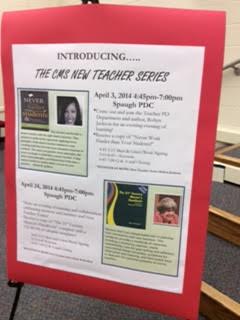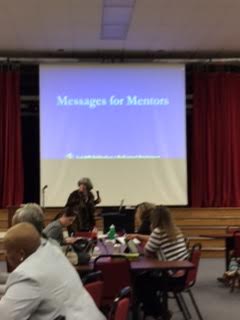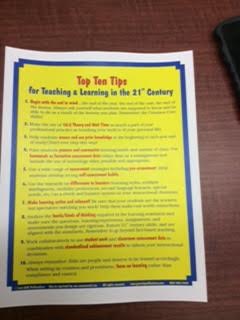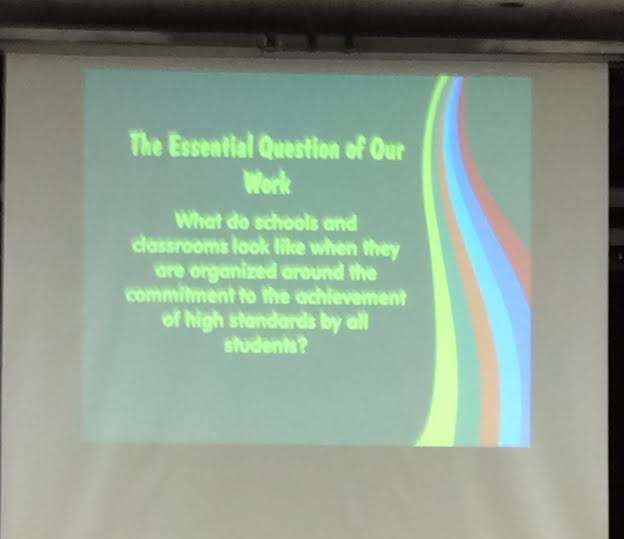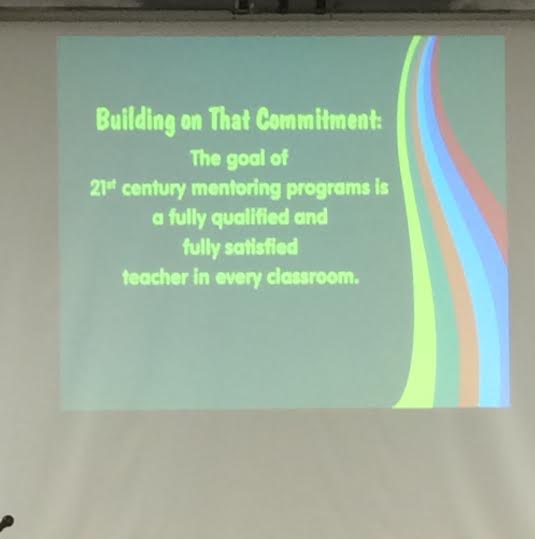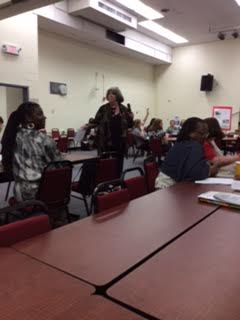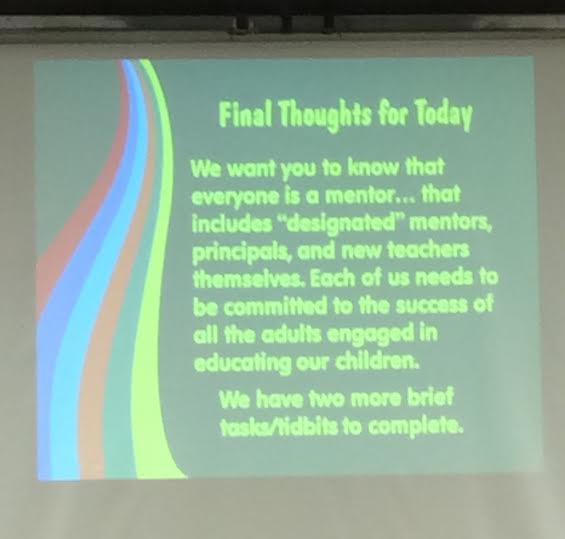Being an Effective Mentor with Paula Rutherford
My school district created a series geared towards new teachers. There were two professional development opportunities available, and as a mentor I thought it was in my best interest to see what resources are available to my mentees. (Okay okay, so I LOVE coaching new teachers and I figured this would help me better coach if I knew what questions new teachers asked and what resources they were attracted to!).
The first portion of The CMS New Teacher Series was with Robyn Jackson based on her book “Never Work Harder than Your Students.” [see my blog post here]
The second portion of the series was with Paula Rutherford about being an effective mentor.
This was extremely beneficial to myself and my interaction with new teachers.
[*New teachers could also benefit from this professional development opportunity because it had lots of resources that help a mentor keep a mentee on track at different points within the year (prior to school beginning, assessment windows, heavy paperwork months, etc). As a new teacher this checklist type resource would help ease my anxiety about the the new road ahead of me.}
I enjoyed getting to meet Paula in person and have a few seconds to chat. She is passionate about education and gives back to her profession in multiple ways. It was an honor to meet her!
This guide book [purchase here] is an easy read that is chalk full of resources to not only make your teaching more effective and manageable, but provides tangible steps for new teachers to follow in order to achieve growth towards effective teaching practices. Her hand-outs were also super helpful and user-friendly!
Paula posed an important question to start off our time together. “What do schools and classrooms look like when they are organized around the commitment to the achievement of high standards by all students?” (I apologize for the fuzzy photo!) This is such a powerful question. Achievement for all students is the mission of most schools. Having high standards for students to achieve is the mission of some schools. But having the COMMITMENT to the achievement of high standards by all students is a mission of very few schools. All teachers need to be driven by this shared commitment. But how do we get teachers there?
It begins with veteran staff and their mindsets. Then they pass on this mindset of commitment through the mentorship of new teachers. “Be an advocate for them!” she shared.
Paula gave us a powerful directive: Go into classrooms with a purpose! This is something I have learned first hand in working with TEACH Charlotte, a new teacher coaching program. When you go into a new teacher’s classroom, there are lots of little things, and sometimes big things, that could be fixed but if you try to correct them all you will overwhelm the teacher and potentially discourage them in the process.
Before entering the classroom choose an aspect of teaching to focus on, look for it in action, leave quick feedback, and then walk out. For example, as a Teacher Development Coach, I hold 1:1 coaching conversations with participants to discuss areas they are doing well in and other areas to focus on. I am transparent that based on that conversation that when I come in to coach I will be looking for that particular growth area (ie. asking higher order questions). During my visit, I look for opportunities for higher order questioning because that is what we together are working on. If the participant does this well, I’ll give a “thumbs up” to encourage them when they attempt the skill, and then cue for the skill when a missed opportunity occurs. When I leave, I put a post-it on the back of the door with one area of achievement (“glow”) and one area for improvement (“grow”). Paula refers to this as “growth producing feedback.” I love that she coins the term in a positive way, that encourages an individual honing their craft to keep trying by having a mentor that supports the growth through feedback that will solely allows for development instead of discouragement and unproductive or unrelated feedback.
Paula is absolutely right. If you go in without a plan, you start to correct lots of minor areas and your new teacher is never able to gain ground in one particular area. I encourage all mentors to share with the mentee the area you are looking for so they can practice showcasing this skill when you are in the classroom. This is the true test of application. If they can talk the talk during your debriefing sessions, then they should be able to walk the walk during an observation. If not, there’s work to do (practice off stage) and that is okay too.
Paula shared an analogy with us that helped describe the community effort for a child’s success. The visual of a 3 legged stool has been referred to in a variety of professional development workshops showcasing each leg being essential for the support of an overarching goal.
In the case of education, each leg could stand for: child, parent and teacher or experienced teacher, new teacher, and principal. In the case of mentorship, focusing on the experienced teacher , new teacher, and principal relationship is essential. The experienced teacher in this case is the mentor, guiding the development and achievement of the new teacher under the support and directives of a principal. Its important that all three individuals share a common vision, so that the mentor and mentee can implement instructional practices with fidelity and meet all requirements for the partnership.
I have had the opportunity of being the new teacher and had great mentors (assigned and unassigned) throughout my journey. It was so helpful to have someone to talk to and use as a resource during my first year and beyond. As I gained momentum in technique and experience, I too became a mentor. I remembered all the questions I had as a new teacher and the resources shared with me, so I made sure to share those same things with my mentee. I continued to grow as my mentee shared other questions they had that I might not have thought of myself, reached out for help implementing new teaching techniques and rolling out new content, as well as needing advice on how to work effectively on a team. These experiences helped me realize how important both the role of the mentee and mentor are for the overall success of the partnership.
Although I am not yet a principal, I am lucky enough to know some pretty darn good ones! A lot of my current (unassigned) mentors are in leadership roles. I love hearing the thought process before an idea comes to fruition, especially in terms of the mentor program. The principal is integral to dreaming up the vision for the partnership, creating a system of accountability to meet expectations, as well as communicating with mentors and mentees often to remain abreast of progress.
Each leg of the stool is so important for the overall success of the new teacher, experienced teacher, and principal partnership that if you were to remove a leg, it would fall apart. Remember, no matter how many years of experience you have, you always have something to contribute to the relationship!
 Speaking of partnerships, Paula had us take this short quiz to help identify our relational habits. I learned a lot about myself in terms of how I share information and how I like to receive information. Notice I said “like?” I learned I need to be more open to forms of communication that are unlike my own (fact based, upfront, no frills). This helps me become a more effective team member when I am aware of my own style and my preferences. By respecting an emotionally charged relationship initiator, I know how to translate the message into my own black-and-white style. I then respond in an emotional way that can easily be translated by that individual instead of responding via my own factual- based preference. Now, a more effective partnership to grow. [purchase the handbook to complete the full survey for yourself!]
Speaking of partnerships, Paula had us take this short quiz to help identify our relational habits. I learned a lot about myself in terms of how I share information and how I like to receive information. Notice I said “like?” I learned I need to be more open to forms of communication that are unlike my own (fact based, upfront, no frills). This helps me become a more effective team member when I am aware of my own style and my preferences. By respecting an emotionally charged relationship initiator, I know how to translate the message into my own black-and-white style. I then respond in an emotional way that can easily be translated by that individual instead of responding via my own factual- based preference. Now, a more effective partnership to grow. [purchase the handbook to complete the full survey for yourself!]
Paula then did a very cool exercise with us as a reminder of how it feels to try something new and the amount of time and effort required in order for it to become a habit. She had us sign our names with our dominant hand. Then, sign our names with our other hand. We called out how it felt, stating:
- Awkward
- Have to think about it
- Frustrating
- Takes a long time
This is exactly what it is like for a mentee to become proficient in teaching! Its awkward to try new strategies. There is a TON of thought put in to every move they make. It can be quite frustrating as they wrestle with this new skill. And, of course, it takes a long time until it becomes natural and feels easy.
I highly suggest any mentor, no matter the content or skill, complete this exercise before helping a mentee because it will give you the foundation and foresight to meet the individual where they are as a novice and emotionally connect to the process they are going through. (Nothing frustrates me more than a leader who is so removed from the groundwork that their policies reflect a lack of knowledge of what its like to implement it first hand. This will take care of that!!)
The life-long learner mentality is pivotal to an individual’s success. If you stop trying to help others or yourself you become stagnant and detrimental to growth momentum. Paula is right. You don’t have to have the “mentor” title to contribute to a relationship in order to make it productive.
If you couldn’t tell by this post, I truly enjoyed learning from Paula. She is knowledgeable but gives you the step by step guidance to gain the knowledge too! She has written a few books worth mentioning: Leading the Learning, a field guide for supervision and evaluation, and for all new classroom teachers, Why Didn’t I learn this in College? She also is President of Just Ask Publications that offers additional professional development. Go check her out!
What resources or experiences have you found effective for mentors/mentees?

